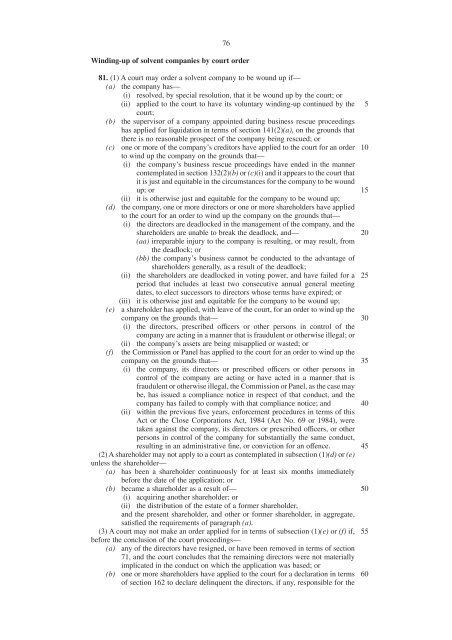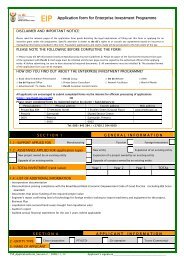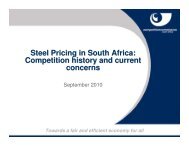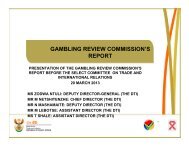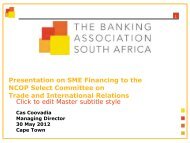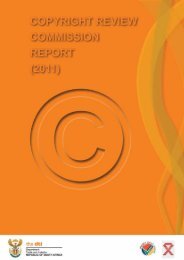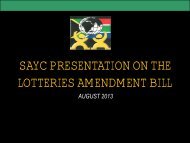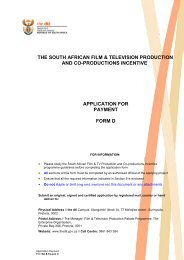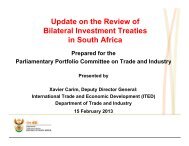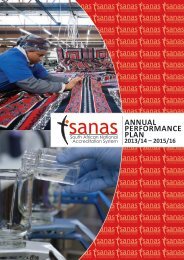COMPANIES BILL - Department of Trade and Industry
COMPANIES BILL - Department of Trade and Industry
COMPANIES BILL - Department of Trade and Industry
Create successful ePaper yourself
Turn your PDF publications into a flip-book with our unique Google optimized e-Paper software.
Winding-up <strong>of</strong> solvent companies by court order7681. (1) A court may order a solvent company to be wound up if—(a) the company has—(i) resolved, by special resolution, that it be wound up by the court; or(ii) applied to the court to have its voluntary winding-up continued by thecourt;5(b) the supervisor <strong>of</strong> a company appointed during business rescue proceedingshas applied for liquidation in terms <strong>of</strong> section 141(2)(a), on the grounds thatthere is no reasonable prospect <strong>of</strong> the company being rescued; or(c) one or more <strong>of</strong> the company’s creditors have applied to the court for an orderto wind up the company on the grounds that—10(i) the company’s business rescue proceedings have ended in the mannercontemplated in section 132(2)(b) or (c)(i) <strong>and</strong> it appears to the court thatit is just <strong>and</strong> equitable in the circumstances for the company to be woundup; or15(ii) it is otherwise just <strong>and</strong> equitable for the company to be wound up;(d) the company, one or more directors or one or more shareholders have appliedto the court for an order to wind up the company on the grounds that—(i) the directors are deadlocked in the management <strong>of</strong> the company, <strong>and</strong> theshareholders are unable to break the deadlock, <strong>and</strong>—20(aa) irreparable injury to the company is resulting, or may result, fromthe deadlock; or(bb) the company’s business cannot be conducted to the advantage <strong>of</strong>shareholders generally, as a result <strong>of</strong> the deadlock;(ii) the shareholders are deadlocked in voting power, <strong>and</strong> have failed for aperiod that includes at least two consecutive annual general meetingdates, to elect successors to directors whose terms have expired; or25(iii) it is otherwise just <strong>and</strong> equitable for the company to be wound up;(e) a shareholder has applied, with leave <strong>of</strong> the court, for an order to wind up thecompany on the grounds that—30(i) the directors, prescribed <strong>of</strong>ficers or other persons in control <strong>of</strong> thecompany are acting in a manner that is fraudulent or otherwise illegal; or(ii) the company’s assets are being misapplied or wasted; or(f) the Commission or Panel has applied to the court for an order to wind up thecompany on the grounds that—35(i) the company, its directors or prescribed <strong>of</strong>ficers or other persons incontrol <strong>of</strong> the company are acting or have acted in a manner that isfraudulent or otherwise illegal, the Commission or Panel, as the case maybe, has issued a compliance notice in respect <strong>of</strong> that conduct, <strong>and</strong> thecompany has failed to comply with that compliance notice; <strong>and</strong> 40(ii) within the previous five years, enforcement procedures in terms <strong>of</strong> thisAct or the Close Corporations Act, 1984 (Act No. 69 or 1984), weretaken against the company, its directors or prescribed <strong>of</strong>ficers, or otherpersons in control <strong>of</strong> the company for substantially the same conduct,resulting in an administrative fine, or conviction for an <strong>of</strong>fence. 45(2) A shareholder may not apply to a court as contemplated in subsection (1)(d) or (e)unless the shareholder—(a) has been a shareholder continuously for at least six months immediatelybefore the date <strong>of</strong> the application; or(b) became a shareholder as a result <strong>of</strong>—50(i) acquiring another shareholder; or(ii) the distribution <strong>of</strong> the estate <strong>of</strong> a former shareholder,<strong>and</strong> the present shareholder, <strong>and</strong> other or former shareholder, in aggregate,satisfied the requirements <strong>of</strong> paragraph (a).(3) A court may not make an order applied for in terms <strong>of</strong> subsection (1)(e) or (f) if, 55before the conclusion <strong>of</strong> the court proceedings—(a) any <strong>of</strong> the directors have resigned, or have been removed in terms <strong>of</strong> section71, <strong>and</strong> the court concludes that the remaining directors were not materiallyimplicated in the conduct on which the application was based; or(b) one or more shareholders have applied to the court for a declaration in terms<strong>of</strong> section 162 to declare delinquent the directors, if any, responsible for the60


